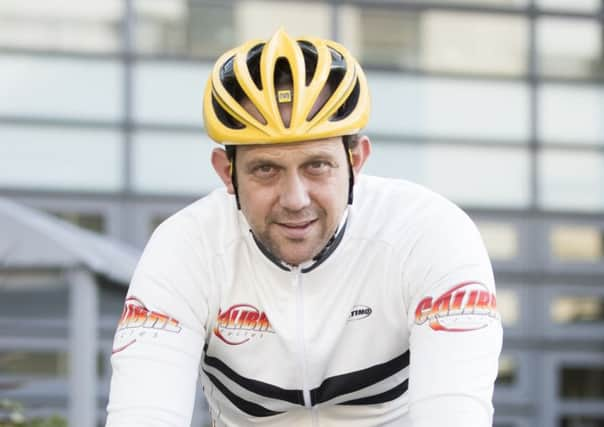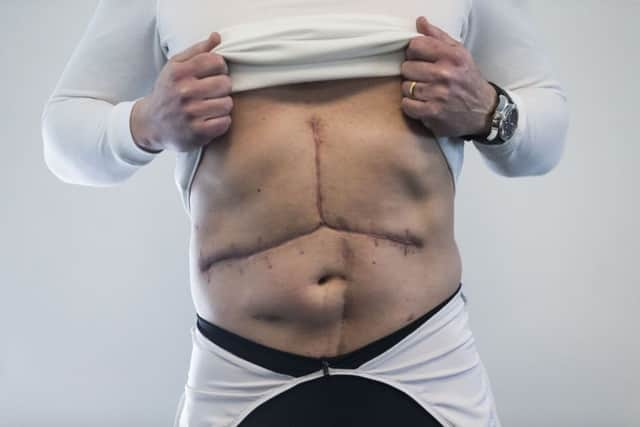Olympic cycling hero: Liver transplant at Leeds hospital saved my life


Grace, who coached Team GB cyclists to seven medals at the Olympic Games in Rio, broke down in tears as he thanked the family of his donor.
The 46-year-old had a life-saving transplant at St James’s University Hospital in Leeds, a regional centre of excellence for the procedure, in November after a donor was found.
Advertisement
Hide AdAdvertisement
Hide AdHe has now revealed that he will take part in the British Transplant Games this year, representing Leeds, and urged other transplant recipients to sign up.


Grace was diagnosed with the liver condition, primary sclerosing cholangitis, when he was 17 and told by doctors that he would need a transplant by the age of 30.
But it was not until December 2015 that he fell ill and quickly became increasingly unwell up until the Rio Games, when Grace said his health “fell off a cliff”.
Doctors at St James’s University Hospital, which provides liver and kidney transplant services for the whole of Yorkshire, allowed him to travel to Brazil under the supervision of Team GB medical staff and he hid his illness from all but those closest to him - even buying tinted glasses to hide the jaundice in his eyes.
Advertisement
Hide AdAdvertisement
Hide AdGrace returned to the UK and was almost immediately placed on the transplant list, the severity of his illness giving him priority over other patients.


A donor was found in November and the New Zealander received the call he had been waiting for.
Speaking to The Press Association, Grace said: “I don’t even know if I would be actually alive today without the amazing ... my donor.” Struggling to contain his emotions, he continued: “Sorry, it’s emotional, I haven’t really talked about it. I’ve bottled it up for four months.
“One of the most important things to remember is that, on the day that I got my liver, another family lost a family member and it tears me up on the inside to know that, but I thank them every single day for what they’ve done for me and my family.”
Advertisement
Hide AdAdvertisement
Hide AdGrace was back in the saddle, on a stationary bike, around nine weeks after his surgery and now, four months after the transplant, he is cycling routes of around 30km and returned to work last week.


He now plans to compete for Leeds in cycling events at the British Transplant Games in North Lanarkshire in July and hopes to compete in future European and World events.
He said: “I’ll do it to participate and I’m going to use that journey to my participation there to try to promote organ donation and really to encourage other people who have had transplants to get up and active and to begin their lives again.”
Grace said keeping fit has helped with his recovery both physically. He said: “My first activity, once I got home, was walking from my front door to my gate and back, assisted by my brother, and that was a big deal for me and each day I just put in a little bit more and a little bit more until I could go out walking for an hour and I think it really helped me mentally as well as physically, just to be out in the air and know that you’ve achieved something during the day.
Advertisement
Hide AdAdvertisement
Hide Ad“It made a really big difference and, even from work, we know that activity can help with your mental well-being as well.


“Come and get active and get involved, that’s one of my focuses for the year. To have a mental focus and something to strive towards, outside of just recovering, I think is really important for the recovery of the patients and it’s certainly helped for me.”
Leeds boasts the largest solid organ transplant centre in the UK, the third largest liver transplant centre and the largest liver cancer surgery unit.
The Leeds Liver Unit, which offers services in all areas of liver transplantation from assessment to long-term post-transplant care, is one of six centres commissioned by NHS England.
Advertisement
Hide AdAdvertisement
Hide AdThe first liver transplant in Leeds was carried out in 1986, but the program has grown since then and the centre now serves patients from across the North. In 2007 it became the first liver transplant program to provide live donor transplantation for NHS patients.